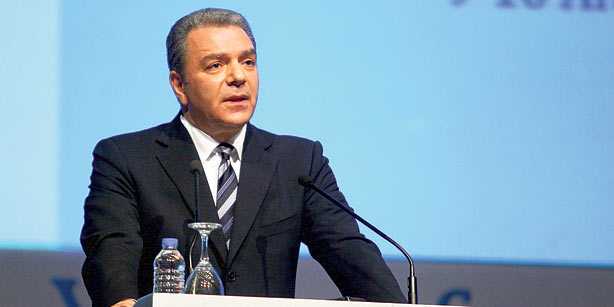Commenting on foreign investors exiting the market, İstanbul Stock Exchange (İMKB) President Hüseyin Erkan has said that foreign investors only represent the 16 percent of the bourse and therefore a capital outflow of $1.6 billion is not cause for concern.

Erkan spoke during the general assembly of the İMKB on Monday and underlined that he was very impressed with the interest shown in the benchmark index (İMKB-100). Also touching on the hot topic at the moment, he said that foreign capital outflows had been witnessed in the İMKB, Erkan noted that foreign investors had purchased stocks with a total value of $2.1 billion in 2010 whereas foreign investors’ total sales in the first five months of this year amounted to only $1.6 billion. “These numbers are really nothing to worry about. The total share of foreigners in our bourse is only 16 percent. I cannot understand people yelling that foreigners are leaving the country or that they are manipulating the market. These are all lies and misleading interpretations,” Erkan said.
Last Friday Turkish shares reached their lowest level in almost three months due to concerns that the central bank is failing to take the measures required to rein in the country’s widening current account deficit. Despite the credit rating upgrades by international rating agencies and despite analysts sharing a common view that Turkey’s credit rating could be increased to “investment grade” after the general elections, the İMKB-100 tumbled by 915.71 points, or 1.5 percent, to 61.491 points at 5:30 p.m. on Friday, the lowest since March 8 after American investment bank JPMorgan Chase & Co. cut the rating of the country’s stock market to “underweight” from “overweight,” citing a growing current account deficit and reduced profit forecasts for banks.
The central bank has increased reserve requirements of banks four times since December to help curb the lending that is being used to buy imported goods and widen the current account gap. Annual loan growth is exceeding 35 percent currently compared with the central bank target of 25 percent, banking regulator data published on Friday confirmed.
Foreign investors: Good or bad?
It has been debated many times whether the İMKB will be dominated by foreign investors and whether they would exit Turkey when they reached their projected profit. Ahmed Münir Bulut, a dealer at participation bank Türkiye Finans, said in a previous statement to Today’s Zaman that foreigner investors are considered long-term investors compared to domestic ones and do not leave the market unless there is a serious problem, such as political tension, that could cause instability. Bulut added that he sees no risk from foreign investors having a high or low percentage of the Turkish market as long as there are no shocks in or outside Turkey.
Analyst Abdulkadir Çakır points to a different issue and says the decline or increase of foreign investors’ shares in the İMKB will not be enough to give the whole picture. He believes there is a big difference between long and short-term investors. “In order to analyze this issue, a distinction should be made between long-term investors such as pension funds, which are more risk averse, and short-term investors like hedge funds, which are more risk seeking,” said Çakır. “Short-term investors are seen as risky investors that use high leverage, a way in finance to multiply gains or losses. A well-known example of a short-term investor case is the mortgage crisis in 2008 where these investors walked away from the Turkish market immediately after news of the bankruptcy of Lehman Brothers hit the headlines in the US. The market reacted negatively to this ‘money flight’ and a fast decline in the market was unavoidable.”

Leave a Reply